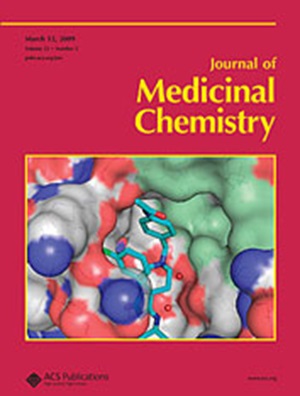psma引导的前列腺癌肿瘤特异性蛋白降解的PROTAC降解物
IF 6.8
1区 医学
Q1 CHEMISTRY, MEDICINAL
引用次数: 0
摘要
通过降解靶蛋白来治疗疾病的PROTACs是一种非常有前途的药物设计策略。然而,非疾病组织中靶蛋白的降解可能导致全身毒性。本研究利用PSMA在前列腺癌中过表达的特点,设计了PSMA引导的protacs特异性靶向前列腺癌。通过可切割连接剂将AR降解剂和BET降解剂分别与PSMA配体偶联,得到了两类PSMA引导的PROTACs。体外实验表明,psma引导的PROTACs选择性地降解过表达psma的前列腺癌细胞中的靶蛋白,而不影响其他细胞中的靶蛋白。体内研究显示,与传统的PROTACs相比,psma引导的PROTACs增强了前列腺癌组织中的药物暴露,延长了半衰期,从而获得了更强、更持久的治疗效果。这项工作为疾病组织特异性PROTAC研究提供了一条新的途径,对前列腺癌的靶向治疗具有重要意义。本文章由计算机程序翻译,如有差异,请以英文原文为准。

PSMA-Guided PROTAC Degraders for Tumor-Specific Protein Degradation in Prostate Cancer
PROTACs that degrade target proteins to treat diseases represent a highly promising strategy in drug design. However, the degradation of target proteins in nondisease tissues may lead to systemic toxicity. Herein, capitalizing on the characteristic overexpression of PSMA in prostate cancer, we devised PSMA-guided PROTACs-specific targeting to prostate cancer. By conjugation of AR degraders and BET degraders separately with PSMA ligands via cleavable linkers, two classes of PSMA-guided PROTACs were obtained. In vitro experiments demonstrated that PSMA-guided PROTACs selectively degraded target proteins in PSMA-overexpressing prostate cancer cells without affecting target proteins in other cells. In vivo studies revealed that compared to conventional PROTACs, PSMA-guided PROTACs enhanced drug exposure in prostate cancer tissues and prolonged half-life and consequently achieved stronger and more sustained therapeutic effects. This work provides a novel avenue for disease tissue-specific PROTAC research, holding significant implications for targeted therapy in prostate cancer.
求助全文
通过发布文献求助,成功后即可免费获取论文全文。
去求助
来源期刊

Journal of Medicinal Chemistry
医学-医药化学
CiteScore
4.00
自引率
11.00%
发文量
804
审稿时长
1.9 months
期刊介绍:
The Journal of Medicinal Chemistry is a prestigious biweekly peer-reviewed publication that focuses on the multifaceted field of medicinal chemistry. Since its inception in 1959 as the Journal of Medicinal and Pharmaceutical Chemistry, it has evolved to become a cornerstone in the dissemination of research findings related to the design, synthesis, and development of therapeutic agents.
The Journal of Medicinal Chemistry is recognized for its significant impact in the scientific community, as evidenced by its 2022 impact factor of 7.3. This metric reflects the journal's influence and the importance of its content in shaping the future of drug discovery and development. The journal serves as a vital resource for chemists, pharmacologists, and other researchers interested in the molecular mechanisms of drug action and the optimization of therapeutic compounds.
 求助内容:
求助内容: 应助结果提醒方式:
应助结果提醒方式:


